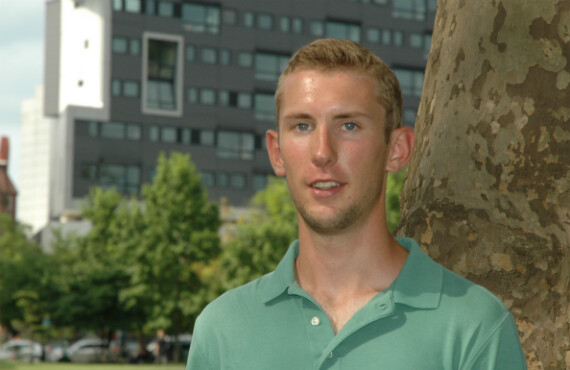Penn Engineer Mark Harding Learns About Himself Via Teaching
(This is the second in a series about University of Pennsylvania students who took their arguments in support of federal student financial aid to Washington this summer in a project organized by the Office of Student Registration and Financial Services. Other profiles feature students Kristin Thomas and Mounica Gummadi.)
Somewhere along the trajectory from his rural upbringing on a Orwigsburg, Pa., farm to training to work on a Navy aircraft carrier’s nuclear reactor, University of Pennsylvania junior Mark Harding starting being pulled in another direction.
His high school interest in chemistry led him to the Department of Materials Science and Engineering in the School of Engineering and Applied Science, but a chance conversation with a friend led him to the Netter Center and its Community School Student Partnerships program. Since the spring semester of his freshman year, he has been teaching elementary students three times a week in West Philadelphia’s Comegys School.
“I always envisioned using my engineering background to go off and work for a defense contractor, but now I’m torn,” Harding says.
During his sophomore year, Harding was accepted into the Navy’s Nuclear Propulsion Officer Candidate program. The program will provide him training in nuclear science that will be put to use in a tour on an aircraft carrier or submarine.
But with his post-graduation plans locked in, Harding found that he was free to explore his other interests and that nothing spoke to him quite like the role he played in the lives of the students he taught. Doubling down on his commitment to education, he is now the Community School Student Partnerships assistant site director for Comegys and continues to do community outreach work during the summer at its free camp.
With the freedom to develop his own curricula at the camp, Harding has been combining his two passions.
“I wanted to get more involved in STEM education, as from personal experience, I can see just how it affects the lives of these kids,” Harding says. “So many times working with these students throughout the year, I saw science as another way to expose kids to math and get them more interested and engaged with school.”
Improving education in science, technology, engineering and math, the so-called STEM fields, has been a priority that has been highly touted by the University’s — and the nation’s — administrations. Training in these highly specialized fields takes such a long time that it is critical to instill an interest at a young age.
Fortunately, Harding has seen that this is something that comes naturally to children, when a teacher meets them halfway.
“Just the other day, I taught the basics of the solar system to eight fourth graders,” Harding says. “During reading or math, some kids tune out, but, with this, all eight brought their chairs up to the front of the class. They were all so curious because kids are usually not exposed to these subjects until middle and high school, where they’re already prone to give up on school.”
He recently joined four other Penn students in Washington, speaking with congressional staffers about the importance of federal support for work-study programs like the ones he has participated in through the Netter Center. Those experiences have encouraged him to explore the possibility of returning to the capital next summer through the Office of Government and Community Affairs to work on STEM education policy.
Once he is finished with his five years of naval service, Harding will have a hard, but important, decision to make. One thing is for certain, however. The children of West Philadelphia have made a lasting impression on him.
“I’ve never felt more useful than this summer. Even with being at Penn, taking these great classes and doing these labs, this is the first time I feel like I’m actually doing something,” Harding says. “I know it sounds cliché, but I really like feeling that I might be affecting even one or two people out there.”








